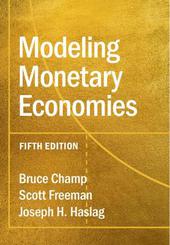
|
Modeling Monetary Economies
Hardback
Main Details
| Title |
Modeling Monetary Economies
|
| Authors and Contributors |
By (author) Bruce Champ
|
|
By (author) Scott Freeman
|
|
By (author) Joseph H. Haslag
|
| Physical Properties |
| Format:Hardback | | Pages:475 | | Dimensions(mm): Height 262,Width 184 |
|
| Category/Genre | Macroeconomics
International economics
Political economy
Public finance |
|---|
| ISBN/Barcode |
9781316515211
|
| Classifications | Dewey:339.5301 |
|---|
| Audience | | Tertiary Education (US: College) | |
|---|
| Edition |
5th Revised edition
|
| Illustrations |
Worked examples or Exercises
|
|
Publishing Details |
| Publisher |
Cambridge University Press
|
| Imprint |
Cambridge University Press
|
| Publication Date |
2 June 2022 |
| Publication Country |
United Kingdom
|
Description
Thoroughly updated and expanded with a new chapter on blockchain and increased coverage of cryptocurrency, as well as new data, this established advanced undergraduate textbook approaches the subject via first principles. It builds on a simple, clear monetary model and applies this framework consistently to a variety of monetary questions. Starting with trade being mutually beneficial, the authors demonstrate that money makes people better off, and that government money competes against other means of payments, including other types of government payments. After developing each of these topics, the book tackles the issue of money competing against other stores of value, examining issues associated with trade, finance, and modern banking. From simple economies to modern economies, the authors address the role banks play in making more trade possible, concluding with the information problems plaguing modern banking.
Author Biography
Bruce Champ was a senior research economist at the Federal Reserve Bank of Cleveland, and passed away in 2013. Earlier, he taught at Virginia Polytechnic Institute, the Universities of Iowa and Western Ontario, and Fordham University, New York. Dr. Champ's research interests focused on monetary economics, and his articles have appeared in the American Economic Review, the Journal of Monetary Economics, the Canadian Journal of Economics, and the Journal of Money, Credit, and Banking, among other leading academic publications. He coauthored the first and second editions of Modeling Monetary Economies with the late Scott Freeman. Scott Freeman was a professor of Economics at the University of Texas, Austin. He taught earlier at Boston College and the University of California, Santa Barbara. He died in 2004. Professor Freeman specialized in monetary theory, and his articles appeared in the Journal of Political Economy, the American Economic Review, the Journal of Monetary Economics, and the Journal of Money, Credit, and Banking, among other eminent academic journals. Joseph H. Haslag is Professor and Kenneth Lay Chair in Economics at the University of Missouri. Professor Haslag received his PhD in Economics from Southern Methodist University, Texas in 1987. Professor Haslag spent twelve years in the Research Department at the Federal Reserve Bank of Dallas, teaching graduate and undergraduate courses at Southern Methodist University. He visited the Economics Department at Michigan State University in 2000, and the Department of Monetary Economics at Erasmus University, Rotterdam in 1994. He has published his research in such prestigious academic journals as the Journal of Monetary Economics, the Journal of Money, Credit, and Banking, the Review of Economics and Statistics, the International Economic Review, and the Review of Economic Dynamics, among other leading academic journals.
Reviews'My students and I have enjoyed using this excellent text because of its clear presentation and use of a simple overlapping generations model to analyze fundamental issues in monetary economics. The new edition retains this approach and expands its coverage of financial stability issues and recent developments in monetary policy. This is clearly the best undergraduate text on monetary economics.' Michael Ellis, Kent State University 'Modeling Monetary Economies is the only textbook that allows undergraduates to learn important results and applications in monetary economics in a rigorous theoretical framework. The fifth edition continues this tradition with the addition of a discussion of blockchains as a monetary record-keeping system, as well as updated applications of the theory to the 2007-8 financial crisis and pandemic-related monetary policy.' Michael Loewy, University of South Florida 'This primer on monetary economics, written by three stalwarts in the field, is already a classic. The material covered is outstanding in its breadth and depth. Unlike other money and banking texts, this one asks more of the reader, but delivers a whole lot more. The writing is fresh and intellectually stimulating, rigorous, and yet approachable. I love this new edition and wish it continued success in its efforts to bring serious monetary economics to the reach of the curious undergraduate.' Joydeep Bhattacharya, Iowa State University 'The textbook Modeling Monetary Economies provides a rigorous treatment of money, banking, and financial intermediation within a unified framework that is accessible to advanced undergraduate students. It addresses the most fundamental questions in monetary theory - e.g., Can fiat money be valued in equilibrium? Can it coexist with interest-bearing assets? Why do banks exist? - without shortcuts. It also covers material that is relevant for today's problems, including cryptocurrencies and blockchain technologies, the design of payment systems, bank regulations, the welfare costs of inflation ... It is a must-read for all students interested in monetary issues.' Guillaume Rocheteau, University of California, Irvine
|